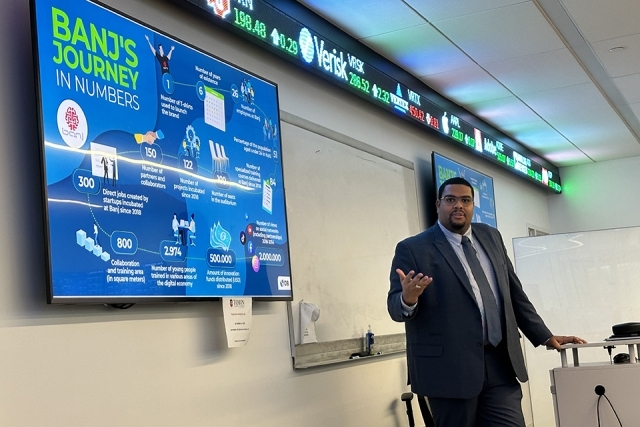
Where some see hopelessness in Haiti, Marc Alain Boucicault sees opportunity.
A tech entrepreneur and business development expert educated in the United States, he has brought visionary instincts back to his native country, investing time, energy, and money to develop Banj, Haiti’s largest entrepreneurship hub and coworking space.
The challenges have been plentiful. But, as he told an audience of would-be entrepreneurs at St. John’s University’s Venture & Innovation Center (VIC), few things of value come quickly in industry.
“Entrepreneurship is exciting in that way,” Mr. Boucicault said. “You never know what the future is going to be. What I am sure of is, I’ve built enough of a foundation to be successful. And we continue to build forth with extremely smart people. It can be frustrating, but I am optimistic.”
Invited as part of the University’s recognition of International Education Week, hosted by the Office of Global Programs, Mr. Boucicault spoke to students, faculty, administrators, and staff at a classroom in The Peter J. Tobin College of Business adjacent to the VIC on November 21. Amid all the trappings of thriving capitalism—electronic stock tickers, data analysis tools, and more—he spoke of building a business from the ground floor in one of the world’s poorest and most politically unstable nations.
Mr. Boucicault’s talk climaxed the Fall 2024 semester at the VIC, the University’s innovation and entrepreneurship incubator. Earlier discussions were led by Long Island, NY, small-business owner Kristy Lee Kung; former Red Storm and Olympic baseball player Alex Katz ’16CPS; Man-Li Kuo Lin, Economic Development Specialist with the US Small Business Administration; and others.
Mr. Boucicault’s hour-long talk was followed by questions from St. John’s students, some of whom were enrolled in Tobin’s master’s degree program in Entrepreneurship. Other students were from Mr. Boucicault’s native country, including Clefton Simon, a Fulbright Scholar and Accounting graduate student, and junior Jude-Alexandre Jean-Baptiste, who is studying Finance, and whose father participated in a Banj business development project in Haiti.
“The most exciting thing about what he is doing is seeing all the people with such diverse professional backgrounds,” Clefton said. “There are always people to connect with. Companies love the people and the skills they find there.”
“Haiti is in a very difficult situation now,” Jude-Alexandre added. “But I believe that technology is the piece that will help us grow. What Mr. Boucicault is doing with Banj inspires me.”
Educated at American University, Harvard University, and the Massachusetts Institute of Technology (MIT), Mr. Boucicault was seen as a rising star in the tech start-up sector in the late 2010s. His decision to leave a responsible, full-time position at MIT to invest in a business incubator in Haiti was met with skepticism by industry insiders.
Poverty, infrastructure challenges, a lack of electricity, and a population fleeing political instability and acute hunger were just a few of the challenges Mr. Boucicault faced in launching Banj—not to mention attempting to build a technology start-up in a country where only one-third of the population has internet access.
But he saw hopeful signs in Haiti’s hard-working, young-adult population, where the median age is 25, and in its diaspora, which despite leaving Haiti, remains dedicated to improving conditions in the home country.
Using a network of connections made while working at MIT, the Inter-American Development Bank, and the World Bank, he established Banj in 2017 driven by the belief that Haiti’s best asset is its young people.
Today, Banj is an essential vehicle in Haiti’s developing tech start-up ecosystem. It has distributed $500,000 in seed money to 122 companies and has more than two million followers on its social media platforms. The name is derived from the Creole word for genius.
He advises St. John’s students and entrepreneurs everywhere: Don’t limit your vision artificially.
"When starting a company, do not give yourself a job description,” Mr. Boucicault said. “When we started, I was the receptionist; l was hosting people, doing marketing, and operations.”
“So, everything you study in school will be useful,” Mr. Boucicault continued. “Whatever and wherever you start, whatever your knowledge is, that knowledge will be the base of what you will use to be successful.”
Related News
Pharm.D. Candidate Earns National CVS Health/AACP Community Pharmacy Award
Last semester, Kharissa Seepersaud, a Pharm.D. candidate in the College of Pharmacy and Health Sciences , and a native of Ghana, was selected as a recipient of the 2025 CVS Health/ AACP Community...
St. John’s Joins National Network to Empower Catholic Leaders
St. John’s College of Liberal Arts and Sciences at St. John’s University is joining a network of 16 Catholic colleges and universities in a grant-funded effort to strengthen listening, dialogue, and...
Q&A with Alicia Calabrese ’94SJC., LEAD Honoree
Alicia Calabrese ’94SJC, Principal of Floral Park Memorial High School, will be among several alumni honored by The School of Education (TSOE) at the 15th Annual Leaders in Education Awards Dinner...
